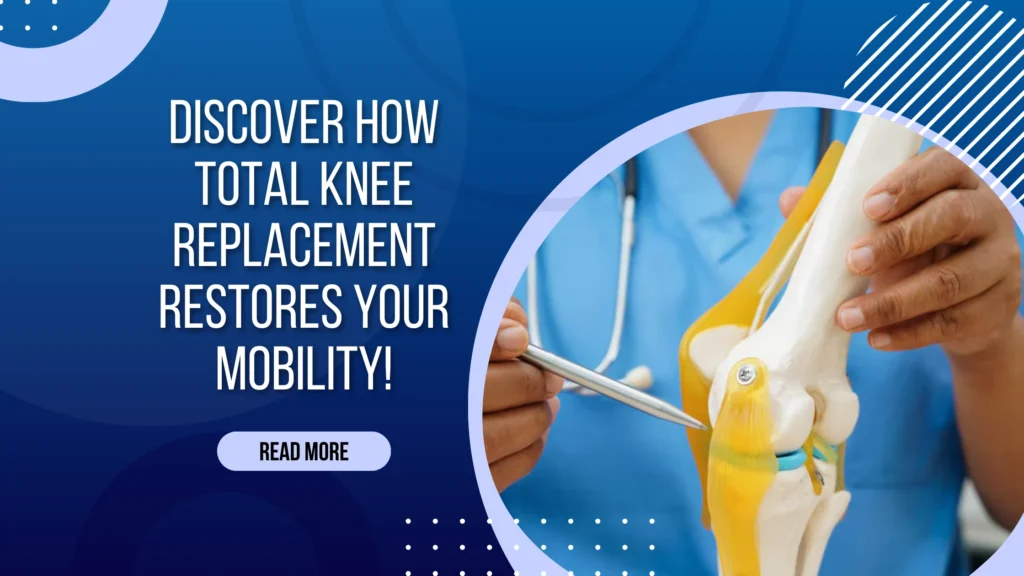INTRODUCTION
Total Knee Replacement (TKR) is a transformative surgical procedure that has improved the lives of millions worldwide by relieving chronic pain, restoring mobility, and enhancing the quality of life for patients suffering from severe knee joint conditions. These conditions, including osteoarthritis, rheumatoid arthritis, and post-traumatic arthritis, cause significant damage to the cartilage and bones of the knee, leading to pain, stiffness, and impaired function. Before the advent of TKR, treatments such as medications, physical therapy, and surgeries like osteotomy offered only limited or temporary relief.
The development of TKR was not the work of a single individual but the result of contributions from several pioneers in orthopaedics. Early designs for artificial knee joints were introduced in the 1950s by innovators like Dr. Leslie G. R. Rorabeck and Dr. Philip D. Lasser, though these initial attempts often failed due to poor biomechanics and durability issues. The modern TKR, as we know it today, was revolutionized in the 1970s by Dr John Insall, a British orthopedic surgeon who is widely regarded as a major pioneer in the field. Dr. Insall developed the Insall-Burstein knee prosthesis, also known as the Total Condylar Prosthesis, which closely mimicked the natural movement of the knee and provided a long-lasting solution for patients.
Alongside Dr. Insall, Dr. Chitranjan S. Ranawat contributed significantly to the refinement of surgical techniques and prosthetic designs during the 1970s and 1980s, further advancing the procedure. These combined innovations turned TKR into one of the most successful surgeries in orthopaedics, allowing millions of patients to regain pain-free mobility and lead active, fulfilling lives.
The first Total Knee Replacement (TKR) surgery is widely credited to Dr. John Insall in the early 1970s. Dr Insall, a renowned orthopaedic surgeon, is celebrated for his pioneering advancements in knee surgery and his significant role in developing the modern technique for TKR. His groundbreaking work led to the creation of the Total Condylar Prosthesis, a design that mimicked the natural movement of the knee, providing a durable and effective solution for patients suffering from severe knee joint conditions. Dr Insall’s contributions have since transformed TKR into one of the most successful and life-changing orthopaedic procedures.
Total Knee Replacement: A new chapter of movement and freedom, where pain gives way to possibilities
DEFINITION
Total Knee Arthroplasty (TKA), commonly referred to as TotalKnee Replacement (TKR), is a widely performed orthopaedic surgical procedure aimed at replacing the damaged articular surfaces (femoral condyles and tibial plateau) of the knee joint. These surfaces are replaced with smooth metal and highly cross-linked polyethene plastic components to restore joint function and alleviate pain.
PURPOSE OF TKR
- TKR is primarily performed to improve the quality of life in individuals with end-stage osteoarthritis, a degenerative joint disease that leads to cartilage damage, pain, and decreased function. The surgery aims to:
- Improve physical activity levels and sports participation for patients who have lost joint function due to severe arthritis.
ANATOMY OF THE KNEE JOINT
The knee is a modified hinge joint made up of the femur, tibia, and patella. The joint surfaces are covered with cartilage, and the menisci (lateral and medial) help absorb shock and provide stability. The knee is supported by ligaments and a joint capsule, allowing it to perform flexion, extension, and limited internal/external rotation movements.
EPIDEMIOLOGY AND ETIOLOGY:
- PrimaryCause: The most common reason for TKR is osteoarthritis, a condition where the joint cartilage degenerates and is unable to absorb shock effectively.
- Risk factors: Risk factors for knee osteoarthritis include gender, increased BMI, knee injuries, and comorbidities such as diabetes or hypertension.
- PainMechanisms: Pain in knee osteoarthritis is influenced by both peripheral and central neural mechanisms, modulated by neurochemical, environmental, psychological, and genetic factors.
DEMOGRAPHICS
TKR is more commonly performed on women and individuals of older age, with higher incidence rates in countries like the US and the UK.
Younger Patients: The number of TKR surgeries is expected to increase dramatically, with more patients under 60 years old undergoing the procedure. However, younger individuals often have additional challenges, such as morbid obesity, smoking, and the desire to return to high-impact activities like sports after surgery.
What Is the Role of Physiotherapy in Tkr?
Physiotherapy plays a crucial role in the recovery and rehabilitation following total knee replacement (TKR)surgery, focusing on restoring function, reducing pain, and improving mobility. Here’s how physiotherapy contributes at different stages of the process:
PreoperativeRole
- Education: Physiotherapists educate patients about the surgery and the recovery process, emphasizing the importance of rehabilitation.
- Strengthening Exercises: Before surgery, physiotherapists guide patients in exercises to strengthen the knee’s muscles, especially the quadriceps, to support faster recovery.
- Range of Motion: Exercises are introduced to improve flexibility and prepare the knee for surgery.
PostoperativeRole
- Pain Management: Physiotherapists help manage pain using techniques, heat, massage, and controlled movement.
- Early Movement: Physiotherapists encourage early mobilization, starting with gentle movements and passive range of motion exercises to prevent stiffness and improve blood circulation.
- Strengthening: As advances, physiotherapists introduce exercises to rebuild muscle strength around the knee and prevent muscle loss.
- ReducingSwelling: Techniques like elevation, compression, and massage are used to decrease swelling and reduce the risk of complications.
- Gait Training: Patients are guided through walking with proper posture and balance, often using crutches, walkers, or canes in the early stages.
Long-term rehabilitation
- Restoring Function: Physiotherapists work on regaining functional movements such as walking longer distances, climbing stairs, and squatting.
- Range of Motion: Ensuring full range of motion is regained in the knee is essential for performing daily tasks.
- Building Endurance: Physiotherapists help improve overall strength and endurance of facilitated daily activities.
- Preventing Future Issues: Advice on posture, safe activities, and exercises are provided to avoid future complications like joint stiffness, muscle weakness, or further injuries.
Why Is Prehabilitation Important Before Tkr?
Prehabilitation, or exercise training before surgery, is a vital strategy for preparing individuals for Total Knee Arthroplasty (TKA) surgery. By focusing on improving strength, mobility, and overall physical function before the operation, prehabilitation can lead to better outcomes both during and after the procedure.
Prehabilitation-Prehabilitation involves a structured exercise program aimed at enhancing strength, flexibility, and functional ability before surgery. For TKA, this typically includes:
- Resistance training
- Flexibility exercises
- Step training
The exercises are typically performed at least three times per week for 4-8 weeks leading up to surgery.
Importance of Prehabilitation Before Tkr Surgery
- StrengthensLegMuscles: Prehabilitation programs have been shown to significantly improve leg strength, particularly in the muscles surrounding the knee, like the quadriceps. Stronger muscles reduce stress on the joint and provide added support during surgery and recovery. The study revealed that patients who engaged in prehabilitation had notably greater knee extension strength than those who did not follow the exercise program.
- Improves Functional Abilities: In addition to strengthening muscles, prehabilitation enhances a person’s ability to perform everyday tasks. For example, prehabilitation participants showed improved performance in activities such as walking, climbing stairs, and standing up from a chair. These improvements help patients recover faster and regain independence more quickly after surgery.
- Prepares the Body for Surgery: Preparing the body for the physical demands of surgery is essential. A stronger body is better able to tolerate the stress of TKA surgery and recover more effectively afterwards. The study showed that prehabilitation helped participants prepare their bodies for surgery by boosting both strength and endurance.
- Accelerates Post-Surgery Recovery: Prehabilitation is linked to a faster recovery after surgery. By increasing strength and functional ability before surgery, patients often experience a smoother and quicker rehabilitation process following TKA. The enhanced ability to perform activities like walking and standing allows for a more rapid return to daily routines.
- Simple and accessible: One of the key benefits of prehabilitation is that the exercises are simple and can be done at home. This makes the program easily accessible, even for individuals who may find it difficult to attend frequent in-person sessions. As a result, patients can continue their exercises without disrupting their daily lives.
What Are the Benefits of Manual Therapy and Modalities in Tkr Recovery?
Manual therapy and physical modalities are important components of the recovery process following Total Knee Replacement (TKR) surgery, offering significant benefits such as pain relief, swelling reduction, improved mobility, and enhanced tissue healing. Here are the key advantages:
- Manual Therapy – Manual therapy involves techniques like joint mobilizations, soft tissue manipulation, and massage. Its benefits include:
- Improved Range of Motion: Joint mobilizations and stretching exercises restore flexibility and enhance knee joint movement, which is essential for daily activities.
- Pain Relief: Manual techniques help reduce pain by relaxing muscles, easing tension, and enhancing circulation around the knee.
- Swelling Reduction: Techniques such as lymphatic drainage and soft tissue manipulation help reduce swelling by promoting fluid movement around the knee area.
- Scar Tissue Prevention: Manual therapy helps minimize the formation of excessive tissue, improving knee function and preventing stiffness.
- Muscle Relaxation: Soft tissue technique massage helps relieve tightness, promote blood flow, and reduce muscle pains, which aids in faster healing.
Modalities
- Modalities involve the use of physical agents such as heat, cold, ultrasound, and electrical stimulation. Their benefits include:
- Pain Management: Cold therapy (cryotherapy) is effective in reducing pain and inflammation during the initial stages of recovery, while heat therapy helps relax muscles and increase blood flow later on.
- Swelling Control: Cold modalities help reduce swelling and inflammation post-surgery, which can minimize stiffness and accelerate healing.
- IncreasedCirculation: Heat therapy and ultrasound promote blood circulation to the knee, supporting tissue healing and reducing muscle tightness.
- Muscle Strengthening: Electrical stimulation (e.g., TENS)helps stimulate muscle contractions, preventing muscle atrophy and strengthening the muscles surrounding the knee.
- TissueRegeneration: Ultrasound therapy and low-level laser therapy(LLLT) support tissue repair and collagen production, aiding recovery.
- Better Functionality: Both manual therapy and modalities contribute to improved knee function by reducing pain, improving range of motion, and restoring strength, allowing patients to return to daily activities with less discomfort.
- Faster Recovery: When combined with exercises and other rehabilitation techniques, manual therapy, and modalities help accelerate the recovery process, reduce complications, and allow patients to resume their normal activities more quickly.
CONCLUSION:
At Vishudh Kaya Clinic, we focus on providing comprehensive physiotherapy care that includes manual therapy, modalities, and structured rehabilitation exercises. These techniques effectively reduce pain, improve joint mobility, manage swelling, and accelerate recovery.
Our physiotherapists at Vishudh Kaya Clinic work closely with patients to tailor treatment plans specific to their needs, ensuring a smooth recovery process. We employ various modalities such as cold and heat therapy, ultrasound, and electrical stimulation to enhance healing, while manual therapy helps improve the range of motion and prevent scar tissue formation. With consistent care and expert guidance, patients can regain strength, and function, and return to their daily activities with improved confidence and reduced discomfort.
At Vishudh Kaya Clinic, we are dedicated to helping patients achieve the best possible recovery after TKR, ensuring they regain independence, improve their quality of life, and reduce the risk of future complications.
Frequently Asked Questions
When should I start physiotherapy after TKR?
Physiotherapy typically begins within a day or two after Total Knee Replacement (TKR) surgery. Early sessions are focused on gentle exercises aimed at improving circulation, reducing swelling, and gradually restoring movement. These initial exercises are crucial for preventing complications like blood clots and stiffness. As recovery progresses, a more structured rehabilitation program will be introduced in the weeks following surgery. This program will focus on strengthening the muscles around the knee, improving flexibility, and helping the patient regain mobility and function to return to daily activities. The exact timeline and intensity of therapy will depend on the patient’s progress and individual needs.
Will I be able to return to normal activities after physiotherapy post-TKR?
After completing physiotherapy post-TKR, most patients can return to normal daily activities such as walking, climbing stairs, and performing basic household tasks. Low-impact activities like swimming, cycling, and walking are typically encouraged as they help maintain joint mobility and strengthen the muscles around the knee. However, high-impact activities, such as running, jumping, or participating in contact sports, may be limited depending on your recovery progress, knee strength, and the advice of your healthcare provider. Physiotherapy plays a crucial role in improving strength, range of motion, and overall function, which helps patients regain their independence and quality of life.
Can physiotherapy help if I still have pain after TKR?
Yes, physiotherapy can significantly help manage pain after Total Knee Replacement (TKR) by improving joint function, enhancing strength in the muscles surrounding the knee, and reducing inflammation. Specific techniques, such as manual therapy, which involves hands-on manipulation to improve joint mobility and reduce stiffness, can be beneficial. Additionally, ice and heat treatments are commonly used to alleviate pain and swelling in the early stages of recovery. These methods, combined with personalized exercise programs, can help optimize the healing process, reduce discomfort, and restore normal function in the knee.
Will prehabilitation prevent complications after TKR surgery?
While prehabilitation cannot eliminate all risks, it plays a crucial role in significantly reducing the likelihood of complications such as blood clots, muscle weakness, joint stiffness, and limited mobility after surgery. By strengthening the muscles surrounding the knee and improving joint flexibility, pre-hab enhances overall knee function, making recovery smoother. Additionally, prehabilitation helps the body heal more efficiently and regain strength faster, reducing the time needed for rehabilitation and contributing to a more successful long-term outcome post-surgery.
What happens if I don’t follow physiotherapy after TKR?
If you don’t follow the prescribed physiotherapy plan after Total Knee Replacement (TKR), you may face several challenges in your recovery. Reduced knee mobility, increased pain, and muscle weakness can occur, leading to stiffness and difficulty with basic activities such as walking or climbing stairs. This can delay your recovery, prevent you from regaining full function, and potentially lead to a poor functional outcome. Adhering to the physiotherapy plan is essential for maximizing your recovery, improving strength, and ensuring the best long-term results from your knee replacement surgery.


